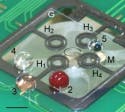Flourescence, nanotech enable rapid gene diagnosis in IBN's new lab-on-a-chip
IBN's lab-on-a-chip uses magnetic nanoparticles to speed and simplify DNA analysis. (Photo: IBN) May 9, 2008 -- The Institute of Bioengineering and Nanotechnology (IBN) in Singapore says it has developed an all-in-one rapid gene diagnosis device that integrates biological sample preparation with polymerase chain reaction (PCR) on a chip. IBN's method uses magnetic nanoparticles to speed and simplify DNA analysis.
IBN, whose mission is to establish a broad knowledge base and conduct innovative research at the interface of bioengineering and nanotechnology, last year introduced a series of Nano-Bio Kits to help secondary school and junior college teachers educate their students.
The institute points out that conventional methods of PCR, which is used to amplify DNA in a biological sample for clinical and medical diagnostic applications, requires hours to complete. And while chip-based analyzers are not new, IBN notes that most require biological samples to be prepared separately using conventional methods. But this new lab-on-a-chip can perform the entire process in just 17 minutes -- and it allows the sample to be introduced directly onto the chip.
IBN's integrated platform harnesses droplets containing magnetic nanoparticles to rapidly complete the entire process. A blood sample can be mixed with a droplet on the chip that contains magnetic nanoparticles. Antibodies on the surface of this droplet will bind with the specific cells to be tested in the blood. Once the blood sample is introduced to the droplet, it is prepared for PCR on the chip.
The nanoparticle-loaded droplet is first moved with a permanent magnet to separate cells from the drop of blood. Next the droplet is moved along the chip to combine with washing solution in order to isolate the cellular materials to be tested. The cell contents in the droplet are then combined with enzymes and reagents for PCR. The sub-µl cellular solution in the droplet is then ready for PCR. It is manipulated through four temperature zones in cycles of eight seconds each. A fluorescence detector monitors the PCR process and indicates if and in what amount a particular gene is present.
In tests of IBN's chip, 30 cells implanted with the genetic information of a marker protein were successfully isolated from 25 µl of blood. The cells were concentrated 100 times, washed, and the gene of the marker protein was detected using real-time PCR. This entire process was completed in 17 minutes.
The IBN lab-on-a-chip requires no other equipment and promises easy adaptation for new biochemical assay tests for diverse applications, such as medical diagnostics, food quality testing and forensics. The IBN-developed device is inexpensive and designed for single-use or disposable application.
"There is tremendous potential for our lab-on-a-chip to be used extensively in medical diagnostics," said Senior Research Scientist Dr Juergen Pipper, who led the IBN research team. "Our droplet-based approach includes biological sample preparation as well as PCR. We are able to achieve significant savings in time and costs with our device," explained Dr Pipper. "The sub-µl scale of the droplet allows swift mass and heat transfer enabling the PCR process to be completed within minutes from the introduction of the actual body fluid sample."
IBN has filed five patents on the integrated lab-on-a-chip and Dr Pipper's team's research has been recently published in the journal Angewandte Chemie.
